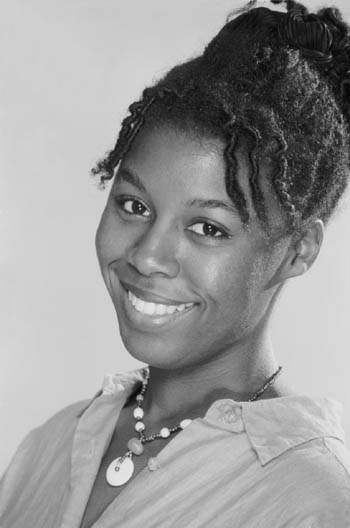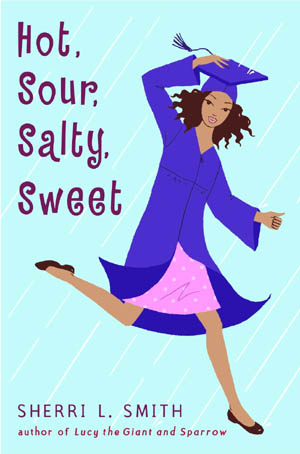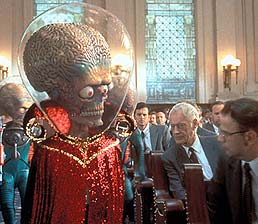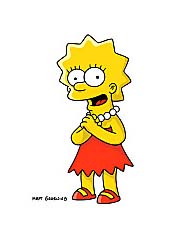Seven Impossible Interviews #67: Sherri L. Smith
 February 26th, 2008 by Eisha and Jules
February 26th, 2008 by Eisha and Jules
 Here’s some food-for-thought:
Here’s some food-for-thought:
“Take a minute to answer this question: If you had one last meal, what would it be? This is one of my favorite dinner party questions. The answer can tell you a lot about someone. Sure, people will ramble, name a dozen items, some of them gourmet dishes from a favorite restaurant, some of them once in a lifetime treats from a vacation overseas, but in the end, if they are like most people, they will end up naming something from their childhood. Something their mother used to make. You can understand, of course, the desire for comfort food if it is indeed your last meal. But, I think it is more than that. It’s an assertion of self, of our origins.”
Those are the words of author Sherri L. Smith, taken from her guest post at The YA YA YAs last week. Her new YA novel — Hot, Sour, Salty, Sweet (Delacorte Press Books for Young Readers; February 2008) — touches upon the issues about which Sherri wrote in that guest-post: one’s origins, identity, self-assertion. The book tells the story of Ana Shen, who has what her social studies teacher calls a “marvelously biracial, multicultural family.” But to Ana, she simply has a Chinese American father and an African American mother (“Those are the bi-races. Calling them cultural or marvelous is a stretch, in Ana’s opinion. But that usually depends on the day”). Grandpa and Grandma White and Nai Nai and Yi Yi, both sets of grandparents, are in town to celebrate Ana’s big day, her eighth-grade graduation, as Ana prepares to make her salutatorian speech. But a broken pipe in the school, which shoots the roof off the building, has other plans. Not to mention Ana’s best friend has convinced her to invite Jamie Tabata, on whom Ana is seriously crushing, for a home-cooked meal after the now-drenched graduation festivities. Ana and her family have a very short time to prepare their favorite dishes for dinner, and Grandma White and Nai Nai can’t seem to agree on anything — and also engage in an intense bid for Favorite Grandmother by lavishing gifts upon Ana, which makes her terrifically uncomfortable. It isn’t until they all sit down for their hot, sour, salty, and sweet (in more ways than just culinary) meal that Ana finally comes to accept the cultural-clashings and the motivations behind them. Kirkus Reviews writes, “{i}n a tale unfolding over one afternoon and evening, Smith serves up a funny, entertaining gumbo of cultural collisions and discoveries.”
This is Sherri’s third novel. Her first one, Lucy the Giant (Delacorte Press; 2002) — which the Bulletin of the Center for Children’s Books described as “a quirky and largely successful melding of fairy-tale happenstance with survival adventure” — was a 2003 ALA Best Book for Young Adults, a 2002 BookSense 76 Pick, and a Bank Street College Best Children’s Book of the Year, amongst many other honors. The novel tells the story of fifteen-year-old Lucy Otswego, the largest girl in her school, who leaves her small Alaska town and her alcoholic father and discovers hardship — and friendship — posing as an adult aboard a commercial fishing boat. Sherri’s second novel, Sparrow (Delacorte Press; 2006), is “a touching novel of a teen left behind by circumstance and a relative who fails her” (School Library Journal). The novel tells the story of high-school student Kendall Washington, who — after the death of the beloved grandmother who raised her — travels to New Orleans. She expects to be taken in by her only living relative, an aunt, but the reunion does not go as planned. Booklist wrote, “the warm characters redefine what family means,” and the novel was named a New York Public Library Book for the Teen Age and an NCSS-CBC Notable Children’s Trade Book in the Field of Social Studies.
We had the pleasure of reading advance reader’s copies of Hot, Sour, Salty, Sweet — which would be well-paired with Rose Kent’s Kimchi & Calamari, another tale of a young teen feeling not unlike an “ethnic sandwich” — and we’re happy that Sherri stopped by today to chat with us (see the bottom of this interview for a listing of the other stops on her virtual book tour, and please note that on February 28th, she’ll be stopping by The Brown Bookshelf). Without further ado, here she is. We thank her for the cyber-visit!
 7-Imp: Sparrow was praised by Booklist for its “warm characters {who} redefine what family means,” given the fact that Kendall’s aunt fails her and she must form “family” in new ways. Hot, Sour, Salty, Sweet (HSSS), on the other hand, is all about a young girl’s blood relatives and the bond she has with them, despite frequent tension with the grandparents. Did you purposefully set out with this novel to write about traditional familial bonds? Essentially, what drew you to tell this particular story?
7-Imp: Sparrow was praised by Booklist for its “warm characters {who} redefine what family means,” given the fact that Kendall’s aunt fails her and she must form “family” in new ways. Hot, Sour, Salty, Sweet (HSSS), on the other hand, is all about a young girl’s blood relatives and the bond she has with them, despite frequent tension with the grandparents. Did you purposefully set out with this novel to write about traditional familial bonds? Essentially, what drew you to tell this particular story?
Sherri: My husband is Chinese American, and I’m black. When we first started dating, some of his relatives disapproved because of my race. We’ve made huge strides since then, but it sent me on a big soul-searching journey where I thought about our future and the future of any child we might have. I decided to write about that kid and see what came out. In the interest of tension, I considered having Ana’s parents be divorced, or having marital problems just to see how that would translate to her—would common marriage issues appear to be race-based to a mixed kid? Would she feel she had to choose an identity? Ultimately, I didn’t feel that helped the story, rather that it muddied the waters. Not to mention, some people do have solid nuclear families. I wanted to give Ana that solid base and see what she made of it. Culturally, Asian and African American people place a strong importance on family. That is one of the similarities I wanted to explore. I was curious to see what sorts of tension and empathies that could create. It can be just as dramatic to stay in the room as it is to storm out and slam the door.
7-Imp: What kind of research did you have to do to write a story with characters from such diverse backgrounds (Chinese, southern African American, Japanese)?
Sherri: I drew a lot on my own experience with my family, as well as stories told by friends. My mom is from New Orleans, so the food Grandma and Grandpa White fix is a first-hand experience. My husband’s parents came from China by way of Taiwan, so his family stories and meals also influenced me. I also read a lot of books about the Chinese American experience, books about historical China and the immigrant experience. I went to a diverse college and was introduced by friends and roommates to the intricacies of inter-Asian cultural conflicts. My Korean friend’s mother was horrified she was dating a Japanese guy, but the Japanese boyfriend made her feel more “white” and less “stared-at” in public than with her previous white boyfriend. One of my other roommates ran with a Chinese gang. I learned all kinds of things from her. For instance, she and her girlfriends wore their hair lightened, scrunched and sprayed six inches high as a method of intimidating more traditional Asian girls. It fascinated me. I also remember standing with a girlfriend who was part Asian when we overheard two Asian guys “reviewing” the pretty girls. One guy pointed to my friend and said “what about her?” And his friend said, “No, she’s mixed.” That blew my mind. You see, I went to an elementary school in Washington, D.C., attended by ambassadors’ kids from around the world. I was pretty much color blind until college, even though I was aware of racism and prejudice. I had been mistreated because of my skin color, but it wasn’t until college that I discovered some of my guy friends would never actually date me because of my race. That shocked me. It also gave me a lot to chew on and put into my writing.
7-Imp: HSSS takes a couple of interesting detours when the point-of-view switches characters — first, when Grandpa White tells his Korean War story, and then when Nai Nai reminisces about the beginning of her courtship with Yi Yi. Why did you decide to give these characters their own narrative voices, and was it difficult to pull off?
Sherri: These switches in point-of-view are some of my favorite moments. They felt very organic to the story. The hardest part was convincing my editor! I actually wanted to give more characters a chance to speak in their own voices, but my editor felt it pulled the story away from Ana, and kids don’t want to read about adults. My reasoning, however, was this: we don’t have the ability to get inside our parents’ heads, or anyone else’s for that matter, but what if we could? That’s partly why I like to write in the first person—it gives us a chance to live someone else’s life from the inside. I thought this would be a great opportunity to let teen readers walk in the shoes of their elders and see where the adults were coming from. It’s a chance to appreciate these people as individuals and not just as iconic relatives.
7-Imp: How did all the glowing reviews and ALA awards for Lucy the Giant affect your writing of your second novel, Sparrow? And likewise, how did the further praise for Sparrow affect Hot, Sour, Salty, Sweet? Did you feel any pressure to top yourself? Or did it make you more confident as a writer?
Sherri: Sparrow was really hard to write for two reasons. One was the fear of a “sophomore slump.” Living up to the first book was a challenge. Secondly, I was close to my grandmother, and there is the death of a grandmother in the story. I started writing Sparrow while my own grandmother was still alive and I couldn’t bring myself to write about G’ma’s death while my grandmother was in failing health. After she passed, I was struggling over what to do and my husband offered to read the draft I had buried away. When he finished it he said, “This is it.” He was right. That was the biggest hurdle. Each book is so different for me that praise for one doesn’t affect how I look at the others, really. Ultimately, I want to grow as a writer, so I look to keep improving my skills. Good reviews and comments from readers can help with that, but the negative stuff (and there is ALWAYS negative stuff) can get you down, so I try to take both the pluses and minuses with a big grain of salt.
 7-Imp: You write about food in HSSS like someone who truly loves to eat. We like that. Can you actually cook any of the fabulously elaborate dishes that Ana and her family prepare for her graduation dinner?
7-Imp: You write about food in HSSS like someone who truly loves to eat. We like that. Can you actually cook any of the fabulously elaborate dishes that Ana and her family prepare for her graduation dinner?
Sherri: It shows, huh? Yep, I love to cook and I love to eat. I have made potstickers before, and they were pretty good. I tend to make oven-fried chicken, rather than deep-fried like Grandpa White, and I’m still trying to master my mom’s gumbo recipe. I make a version of mabo tofu that my husband stuffs himself silly with, and I can bake a pretty darn good chocolate cake. I’ve been trying to increase my Chinese cooking skills since my husband and I moved in together. I think you should be able to eat all of your favorite foods at home—that’s part of what makes it home. So I’ve piled up on cookbooks recommended by his aunts and every once in a while I try my hand at something his grandmother used to make. I’m terrible at it right now, but getting better!
7-Imp: What led you to the idea of writing about someone with such a towering height (of all the primary physical traits a character can have) in Lucy the Giant?
Sherri: Lucy was inspired by a story a woman named Nancy told me about a girl she knew when she was teaching in Anchorage, AK. One of the kids she worked with was very obese. She sighed and said, “Lucy, Lucy the Giant.” It was like a bell going off in my head and it stuck until I finished the story. I opted to go with someone who was overall large, rather than obese because I wanted it to be a story about someone who didn’t fit in, rather than a story about weight. Everyone can relate to that feeling of physical and emotional awkwardness, whether or not it’s as apparent on the outside. With Lucy, her size also gave her the added complication of appearing to be something she’s not. Like girls who hit puberty at an early age and look older than they are, I think the experience of mistaken maturity is interesting. How do you handle situations for which you are really just too young to be equipped?
7-Imp: Please tell us about your involvement with the film Mars Attacks! We’re big stop-motion animation fans (Eisha loves Robot Chicken, and we both love Wallace & Grommit) and would love to hear about your work in the field.
 Sherri: I love Wallace and Grommit, too! Originally, all of the Martians in Mars Attacks! were supposed to be stop-motion animated. I was the Assistant Animation Production Coordinator for the Martian sequences. My job was to track the progress of the animation, scene by scene, all the way down to the number of frames per shot. The animators were hugely talented and great fun. I met one of my best friends on that movie. Unfortunately, stop-motion is a time-consuming process and Hollywood is an impatient town. The director and producer ultimately decided to go with computer-generated Martians based on our stop-motion designs. It was heart-breaking but, for a few sunny months, it was the best time of my life.
Sherri: I love Wallace and Grommit, too! Originally, all of the Martians in Mars Attacks! were supposed to be stop-motion animated. I was the Assistant Animation Production Coordinator for the Martian sequences. My job was to track the progress of the animation, scene by scene, all the way down to the number of frames per shot. The animators were hugely talented and great fun. I met one of my best friends on that movie. Unfortunately, stop-motion is a time-consuming process and Hollywood is an impatient town. The director and producer ultimately decided to go with computer-generated Martians based on our stop-motion designs. It was heart-breaking but, for a few sunny months, it was the best time of my life.
7-Imp: You work for Bongo, the comic book company that brings us “The Simpsons” in print. So, who’s your favorite “Simpsons” character, if you have one at all? And why? (One-half of 7-Imp is a hopelessly nerdy fan of that show).
 Sherri: That would have to be Lisa Simpson—bookish and nerdy with an over-developed since of right and wrong, and an animal-lover to boot. If the Simpsons were astrological signs, she’d be mine.
Sherri: That would have to be Lisa Simpson—bookish and nerdy with an over-developed since of right and wrong, and an animal-lover to boot. If the Simpsons were astrological signs, she’d be mine.
7-Imp: Can you tell us about any new titles/projects you might be working on now?
Sherri: Right now I’m working on a great story called Flygirl, about the Women’s Airforce Service Pilots (WASP) in World War II. That’s right, folks, women flew planes for the military in during the war on non-combat missions. Some of them even died in service to the country. Flygirl is the story of a light-skinned black girl who passes for white to join the WASP program. The army was segregated back then, and the program was so controversial already (What? Women can’t fly!) that adding race to the mix would have killed it. So my character joins up it the only way she can, by crossing the color line.
7-Imp: We know this is a cliché question, but as book lovers, it interests us: What books or authors influenced you as an early reader?
Sherri: As a kid, I was a big fan of E.B. White. I read Charlotte’s Web something like 104 times. I would finish the last page, announce what number reading that was to whoever was in the room, and start over again. I also loved Lloyd Alexander, Lewis Carroll, J. M. Barrie and Mother Goose. As I got a bit older, I devoured Susan Cooper and moved on to some bigger works of fantasy and science fiction. Marion Zimmer Bradley’s Mists of Avalon was a revelation. In high school, I was introduced to Virginia Woolf. That changed my life. She writes the way other people dream. Fantastic.
7-Imp: What’s one thing that most people don’t know about you?
Sherri: I went to charm school at the Montgomery Ward department store in Maryland. The Wendy Ward School of Charm. I’m proud of that. People who do know about it mock me for it, but so what? I’m a properly-trained lady!
 7-Imp: If you could have three (living) authors — whom you have not yet met — over for coffee or a glass of rich, red wine, whom would you choose?
7-Imp: If you could have three (living) authors — whom you have not yet met — over for coffee or a glass of rich, red wine, whom would you choose?
Sherri: Hmm. Well, what if I’ve met them but only in a lame, fangirl kind of way? Then I’d say China Mieville and Susan Cooper, right off the bat. But, to the letter of the question, I’ll say: Jonathan Stroud, Charles Palliser and Nalo Hopkins. It would be an interesting tea, indeed.
7-Imp: What is your favorite word?
Sherri: “Crunch.”
7-Imp: What is your least favorite word?
Sherri: “Due.”
7-Imp: What turns you on creatively, spiritually or emotionally?
Sherri: Talking to other creative people. It gives me a buzz.
7-Imp: What turns you off?
Sherri: Paperwork of any kind. I feel like I’m drowning in paper—junk mail, bills, you name it.
7-Imp: What is your favorite curse word?
Sherri: YA authors never swear.
7-Imp: What sound or noise do you love?
Sherri: My husband’s cat saying hello. Not quite a purr, not quite meow. It’s like an audible question mark.
7-Imp: What sound or noise do you hate?
Sherri: Arguing.
 7-Imp: What profession other than your own would you like to attempt?
7-Imp: What profession other than your own would you like to attempt?
Sherri: Polynesian dancer. Hula is awesome, and you get to dance in warm places.
7-Imp: What profession would you not like to do?
Sherri: Proctologist or podiatrist.
7-Imp: If Heaven exists, what would you like to hear God say when you arrive at the Pearly Gates?
Sherri: Heh. That’s a toss up between “Not yet” and “Welcome home.”
For more online information about Sherri L. Smith:
- Sherri’s site.
- “Food for Thought — Cooking, Characters and Cultural Diversity: A guest post by Sherri L. Smith”; The YA YA YAs; February 21, 2008.
- Interview by Little Willow at Bildungsroman; February 18, 2008.
- “Guest Blogger: Sherri L. Smith!!”; Finding Wonderland; February 12, 2008.
- Sherri’s biography at biography.jrank.org; 2008.

Flygirl sounds amazing. I sure hope it becomes a real live book, because I want to read it!
Thanks. Can’t wait to read these. And yea, Lisa Simpson and Lloyd Alexander! Somehow, after reading this interview, I think both those two would like Sheri back.
[…] I’m loving the sound of Sherri L. Smith’s new book, Hot, Sour, Salty, Sweet. She’s been handing around the kidlitosphere these days at The YA YA YAs and at Seven Impossible Things Before Breakfast. […]
Kick-ass interview, you guys! I’m a fellow Simpsons nerd so I was intrigued by the Bongo Comics connection. Great stuff!
Very cool to see Sherri here.
Hurrah for bookish animal lovers!
[…] A few random links and thoughts February 26, 2008 Filed under: Book News — Trisha @ 8:25 pm Sherri L. Smith’s blog tour continues. Today she’s at Seven Impossible Things Before Breakfast. […]
What a fabulous interview — food, hula, multicultural characters and charm school — all things I can definitely identify with. Must read the new book! Thanks.
Great interview. Sherri’s books sound good. Love her description of her friends.
[…] An interview with Sherri at 7-Imp […]
I’m reading your book, Flygirl. I know this is a true story. ANd, another thing, you are a great writer…
Ted Lewis
Boston: Independent TV Producer, BNN-TV